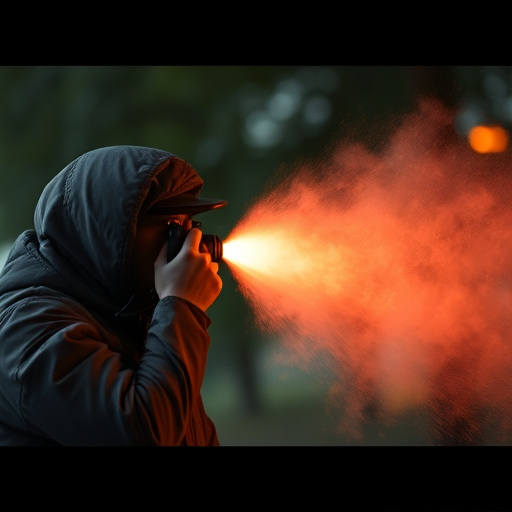Pepper spray, containing capsaicin, temporarily incapacitates attackers by irritating eyes and respiratory system, aiding escape. It does not cause permanent blindness but may reduce visibility for up to 30 minutes. Choosing the right spray with strong concentration, good range, and easy trigger mechanisms is vital. Correct usage, understanding limitations, and regular training ensure its safety and effectiveness as a personal defense tool, dispelling myths about blinding capabilities.
Personal safety is paramount, especially with the growing importance of being prepared for unexpected threats. One powerful tool in many people’s arsenals is inflammatory pepper spray, designed to incapacitate and deter attackers. This article cuts through the noise, offering a comprehensive guide to understanding pepper spray, dispelling myths about its blinding capabilities, and helping you choose the right defense. Learn essential safety precautions for effective use, ensuring your peace of mind without undue alarm.
- Understanding Pepper Spray: A Quick Overview
- Can Pepper Spray Blind You? Debunking Myths
- Choosing the Right Personal Safety Inflammatory Pepper Spray
- Effective Use and Safety Precautions
Understanding Pepper Spray: A Quick Overview
Pepper spray, also known as oleoresin capsicum (OC) spray, is a non-lethal self-defense tool designed to temporarily incapacitate an attacker. It’s a powerful liquid that contains capsaicin, the active ingredient found in chili peppers. When sprayed, it irritates the eyes, nose, and respiratory system, causing severe discomfort and temporary blindness—it can even disrupt vision for up to 30 minutes in some cases. This disruption offers individuals precious time to escape potentially dangerous situations.
Despite its effectiveness, pepper spray is not without its limitations. It’s crucial to understand that it’s not guaranteed to completely blind an assailant; the effect varies based on factors like distance, concentration of the spray, and individual sensitivity. However, even a temporary loss of vision can be life-saving, providing the user with an opportunity to get away and call for help.
Can Pepper Spray Blind You? Debunking Myths
Many people wonder if using pepper spray could potentially blind them, leading to a misconception that it’s best avoided for self-defense. However, this fear is largely based on myths and misunderstandings. Pepper spray does not cause permanent blindness; its primary effect is to temporarily incapacitate an attacker by irritating the eyes, nose, and throat. The irritant in pepper spray, capsaicin, disrupts the transmission of pain signals from the eyes to the brain, leading to temporary blindness or reduced visibility.
While it can be uncomfortable and even dangerous if used in close proximity to the face, pepper spray is designed to deter an attacker for a brief period, allowing the user to escape. When used responsibly and according to instructions, pepper spray does not pose a risk of causing permanent eye damage. It’s crucial to understand these facts to dispel the myth that can pepper spray blind you and encourage individuals to consider it as a legitimate personal safety tool when necessary.
Choosing the Right Personal Safety Inflammatory Pepper Spray
Choosing the right personal safety inflammatory pepper spray is crucial, especially as it could be a difference maker in potentially dangerous situations. Key factors to consider include its strength (measured in capsaicin units), range, and duration of effectiveness. It’s important to note that while pepper spray can deter attackers and disable them temporarily, it does not blind you; however, the intense irritation can significantly reduce visibility.
Additionally, look for features like a sturdy construction for durability, easy-to-use triggers, and a design that suits your hand size for comfort and control. Ensure the brand has a reputation for quality and consistency in their formulations. Remember, training with the spray before needing it is also highly recommended to familiarize yourself with its operation and maximize its effectiveness.
Effective Use and Safety Precautions
Pepper spray is a powerful tool for personal safety, but its effective use and safety precautions are crucial. When deployed correctly, pepper spray can disable an attacker by causing intense irritation to the eyes and respiratory system, giving you valuable time to escape or seek help. However, it’s important to remember that pepper spray is not a weapon of mass destruction; it is designed to incapacitate temporarily. Aiming for the face and eyes is key, as these are sensitive areas. But be mindful: while pepper spray can’t blind you permanently, it can cause temporary blindness and severe discomfort, so ensuring your safety first and using only what’s necessary is paramount.
Safety precautions extend beyond the act of using the spray. Storing it properly, keeping it out of reach of children and unauthorized individuals, and understanding its shelf life are essential. Always check local laws regarding pepper spray ownership and usage to ensure you’re compliant. Additionally, be aware that wind direction can affect the spray’s effectiveness, so consider environmental factors when deciding to use it. Regular training and familiarization with the device are also recommended to boost your confidence and proficiency in using pepper spray effectively and safely.
Pepper spray is a powerful personal safety tool, but it’s essential to understand its limitations. Contrary to common myths, pepper spray cannot permanently blind you; it only temporarily incapacitates an attacker by irritating the eyes and respiratory system. When choosing the right spray, consider factors like range, strength, and ease of use. Always follow safety precautions, such as aiming for the face and keeping a clear escape route. Responsible use of personal safety inflammatory pepper spray can be a game-changer in high-risk situations, enabling you to protect yourself effectively while navigating potentially dangerous environments.
